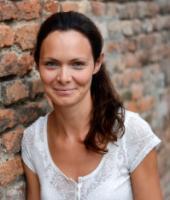Haas, Marita | Austria

Marita Haas is a senior researcher at Vienna University of Technology. Her research is funded with the Hertha Firnberg Program of the Austrian Science Fund (T556-G17). She graduated from the University of Vienna and holds a doctoral degree in social sciences. After finishing her PhD, she worked as a scientific consultant for universities and public organizations. She spent several years in private businesses, co-founded an IT start-up and is still doing consulting on gender and diversity issues for innovative, technology-intensive companies.
Currently, Marita Haas is working on identity constructions of women in male-dominated vs. female-dominated professions. Her research is driven by critical thinking, a de-constructive approach, and related to the theory that organizations are gendered and systematically privilege and/or discriminate people. Recent results of her work have been published in Gender, Work & Organization as well as in Current Sociology. She gives lectures at the University of Vienna, Vienna Technical University and University of Goettingen.
Project at IAS-STS: The neglected body of the female scientist
While the picture of the ideal scientist including normative expectations of analytical competence, objectivity, and rationality has been thoroughly investigated (cf. Acker, 1990; Faulkner 2007, 2008; Fritsch, 2014; Knights & Richards, 2003; Metz-Göckel, 2009), less emphasis has been given to how the scientific body is constructed.
In management the notion of the “ideal” organizational member corresponds with the ideal (strong, healthy and beautiful male) body of this individual. In academe, the picture of the ideal scientist (cf. Acker, 1990; Faulkner 2007, 2008; Fritsch, 2014; Knights & Richards, 2003; Metz-Göckel, 2009), does at first glance not describe a specific body. Instead, academic work is seen as mindful and bodyless (Bell & Sinclair, 2014). However, this separation of the mind from the body also refers to the distinction of men and women, respectively the masculine and the feminine as well as mindfulness – as a stereotypical male attribute – vs. emotion – a stereotypical female attribute (Hope, 2011). The mind-body – dualism in the area of knowledge production then leads to sexuality and femaleness as a taboo: Only scientific results count; and the requested objectivity is clearly related to the masculine norms and not to the feminine body. By taking a social constructionist perspective, these propositions are addressed and examined on the basis of narrative-biographical accounts of female scientists in Science and Technology.
Selected Publications
While the picture of the ideal scientist including normative expectations of analytical competence, objectivity, and rationality has been thoroughly investigated (cf. Acker, 1990; Faulkner 2007, 2008; Fritsch, 2014; Knights & Richards, 2003; Metz-Göckel, 2009), less emphasis has been given to how the scientific body is constructed.
In management the notion of the “ideal” organizational member corresponds with the ideal (strong, healthy and beautiful male) body of this individual. In academe, the picture of the ideal scientist (cf. Acker, 1990; Faulkner 2007, 2008; Fritsch, 2014; Knights & Richards, 2003; Metz-Göckel, 2009), does at first glance not describe a specific body. Instead, academic work is seen as mindful and bodyless (Bell & Sinclair, 2014). However, this separation of the mind from the body also refers to the distinction of men and women, respectively the masculine and the feminine as well as mindfulness – as a stereotypical male attribute – vs. emotion – a stereotypical female attribute (Hope, 2011). The mind-body – dualism in the area of knowledge production then leads to sexuality and femaleness as a taboo: Only scientific results count; and the requested objectivity is clearly related to the masculine norms and not to the feminine body. By taking a social constructionist perspective, these propositions are addressed and examined on the basis of narrative-biographical accounts of female scientists in Science and Technology.
